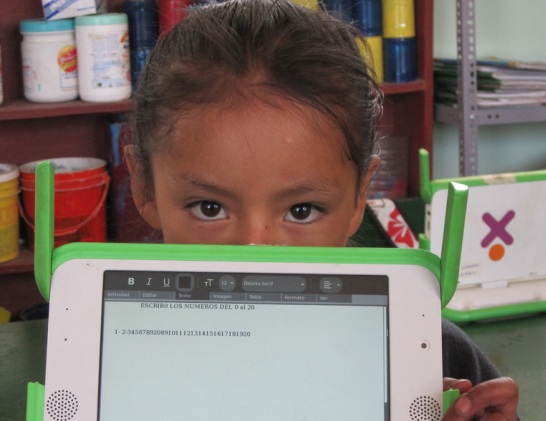Resumen en español al final del artículo

An example of the numbers typing exercise mentioned in the AP article
I think it's safe to say that no other OLPC project has received as much attention in 2012 as Peru's Una Laptop por Niño. The second report of the IDB evaluation, the month-long EduTechDebate around it, the "Error Message" article by The Economist, the many replies to it by Oscar Becerra, Rodrigo Arboleda, and Nicholas Negroponte, and now the recent posts over on a World Bank blog and an IDB blog.
And that doesn't even include all the mailing list threads, private e-mails, and in-person discussions which have also taken place in the past few months. So even for people who read the "olpc" Google News alerts during lunch and sometimes fall asleep while watching the #olpc hashtag stream on Google+ and Twitter it can be hard to keep track of the overall conversation around Peru's OLPC project.
As such I was very happy when I read Associated Press' "Peru's ambitious laptop program gets mixed grades" story during lunch today. It provides a great overview of the broad spectrum of opinions about the project. Not surprisingly it includes many voices which we've previously featured here on OLPC News such as Oscar Becerra, Eugenio Severin, Jeff Patzer, and Pablo Flores.
One person which I've only informally spoken to (but plan to follow up with in the form of a Q&A like we recently did with OLPC Australia's CEO Rangan Srikhanta) is Sandro Marcone who succeeded Oscar Becerra as the person in the Peruvian Ministry of Education who runs the project.
His comments are also the ones I found to be most interesting, especially at the end of the article where it says:
Sandro Marcone, the education official who took over Peru's OLPC program last year, has already made modifications to the program, including making the XO laptop part of Peru's university teacher-training curriculum this year so young educators are fully familiar with it.
Marcone's office will continue to support the laptops and replace broken ones.
It plans to expand rural Internet penetration and put new support resources online. Part of the new strategy is to encourage regional governments to manage their own educational technology and support.
I'm particularly happy about XOs and Sugar becoming part of the Peruvian teacher-training curriculum as this indicates that there's a long-term commitment to the project. Previously some people had feared that the new government (which came into office a year ago) might discontinue the project.
The move towards a more decentralized approach which gives regional governments more responsibilities is something that's been in the works for quite some time. Personally I tend to believe that this is somewhat of a double-edged sword. On the one hand it gives regions more flexibility to move ahead independently. On the other hand I fear that it could also lead to inefficiencies as educational wheels and flat tires might be reinvented within the country due to a lack of centralized knowledge transfers.
At the very end of the article Sandro Marcone is quoted with a comment which should make everyone working on large-scale OLPC and other ICT4E projects pause for a second:
"The ministry is not going to do another macro project of this type. It is not going to make multimillion-dollar purchases and distribute (computers) like candy."
Resumen en español: Creo que es seguro decir que ningún otro proyecto de OLPC ha recibido tanta atención en el año 2012 como el Una Laptop Por Niño del Perú. Incluso para personas que pasan mucho tiempo siguiendolo no es facil mantenerse al corriente de todas las discusiones sobre la iniciativa. Por lo tanto me sentí muy feliz cuando leí el articulo "Peru's ambitious laptop program gets mixed grades" ("ambicioso programa de computadoras portátiles en Perú saca grados mixtos"). Hablando con gente como Oscar Becerra, Eugenio Severin, Patzer Jeff y Pablo Flores (que nosotros tambien hemos previamente presentados aquí en OLPC News) el artículo presenta el gran espectro de opiniones sobre el proyecto y les recomiendo leerlo.


"The ministry is not going to do another macro project of this type. It is not going to make multimillion-dollar purchases and distribute (computers) like candy."
Now why would they decide this?? For ones there is modern eduction delivered and the local goverments don't want to invest for the future of their children and country ... sad world we live in!